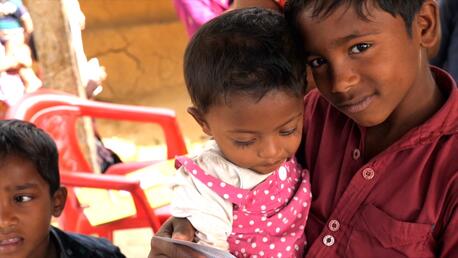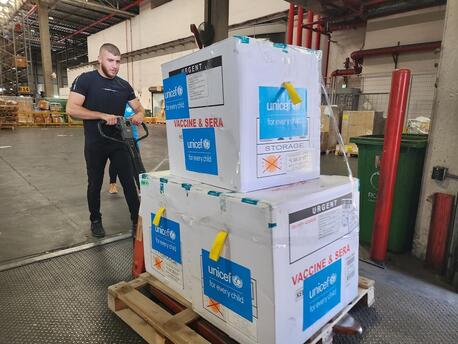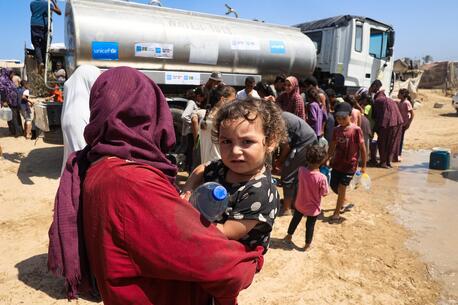
Report Finds Poor Hygiene at Over Half of All Health Facilities
New estimates from UNICEF and WHO reveal that more than half of the world's health facilities need to improve water, sanitation and hygiene services to reduce disease risk.
Some 3.85 billion people around the world rely on health care facilities that lack basic hygiene services needed to prevent and control the spread of disease, increasing the risk of infection, according to a new report from UNICEF and the World Health Organization.
The number includes 688 million people who receive care at facilities with no hygiene services at all.

A nurse washes her hands before examining a patient at a hospital in Bhawanipur, Purnea, Bihar State, India. © UNICEF/UN0581558/Das
According to the report, an analysis of data from 40 countries, an estimated 51 percent of facilities globally lack water and soap or alcohol-based hand rub at points where patients receive care and near toilets. The data also shows that 1.7 billion people lack basic water services at their health care facility — including 857 million people who have no water service at all.
The report, produced by the WHO/UNICEF joint monitoring program team, is a 2022 update on national, regional and global progress toward Sustainable Development Goal targets related to water, sanitation and hygiene (WASH) and is considered the most comprehensive report of its kind to date.
A 'death trap' for pregnant mothers, newborns and children
Health care facilities are, of course, meant to be places of healing. Without basic WASH services, they risk contributing to more disease, prolonged hospital stays and preventable deaths instead.
As the report notes, contaminated hands and environments play a significant role in pathogen transmission in health care facilities and the spread of antimicrobial resistance. Interventions to increase access to handwashing with water and soap and environmental cleaning form the cornerstone of infection prevention and control programs and are crucial to providing quality care, particularly for safe childbirth.
"If health care providers don’t have access to a hygiene service, patients don’t have a health care facility,” said Kelly Ann Naylor, UNICEF Director of WASH and Climate, Environment, Energy and Disaster Risk Reduction (CEED). “Hospitals and clinics without safe water and basic hygiene and sanitation services are a potential death trap for pregnant mothers, newborns and children.
"Every year, around 670,000 newborns lose their lives to sepsis. This is a travesty – even more so as their deaths are preventable.”
Every year, around 670,000 newborns lose their lives to sepsis. This is a travesty – even more so as their deaths are preventable.
The report also highlights the uneven coverage of WASH facilities across regions and income groups. The proportion of health care facilities with no sanitation services ranged from 3 percent in Latin America and the Caribbean and Eastern and Southeast Asia regions to 22 percent in sub-Saharan Africa.

A nurse demonstrates how to wash hands to relatives of patients at a UNICEF-supported hospital in Santa Elena, Ecuador. © UNICEF/UNI388362/Arcos
Universal basic WASH services in health care facilities — the ideal scenario — could be achieved in 46 least developed countries by 2030 for less than $10 billion, or less than $1 per person per year, according to the report.
"Achieving universal access to WASH in health care facilities requires political will and strong leadership at both national and facility levels — but is highly cost-effective, and would yield substantial health benefits," according to WHO's website.
"Hygiene in health care facilities cannot be secured without increasing investments in basic measures, which include safe water, clean toilets and safely managed health care waste," Dr Maria Neira, WHO Director, Department of Environment, Climate Change and Health. "I encourage [UN] Member States to step up their efforts to ... strengthen water, sanitation and hygiene (WASH) services in health care facilities, and to monitor these efforts.”

A woman washes her hands at a water point built by UNICEF at Cibingu health center near Bukavu, South Kivu province, Democratic Republic of the Congo. © UNICEF/UN0549898/Dubourthoumieu
UNICEF works with governments and other partners to help countries strengthen WASH services and support in hospitals, schools, households and communities. Help UNICEF continue this important work. Donate today.
Top photo: The in-charge nurse at Fort Portal Regional Referral Hospital in Uganda sanitizes her hands after attending to patients in the pediatric ward. © UNICEF/UN0572775/Wamala
HOW TO HELP
There are many ways to make a difference
War, famine, poverty, natural disasters — threats to the world's children keep coming. But UNICEF won't stop working to keep children healthy and safe.
UNICEF works in over 190 countries and territories — more places than any other children's organization. UNICEF has the world's largest humanitarian warehouse and, when disaster strikes, can get supplies almost anywhere within 72 hours. Constantly innovating, always advocating for a better world for children, UNICEF works to ensure that every child can grow up healthy, educated, protected and respected.
Would you like to help give all children the opportunity to reach their full potential? There are many ways to get involved.





